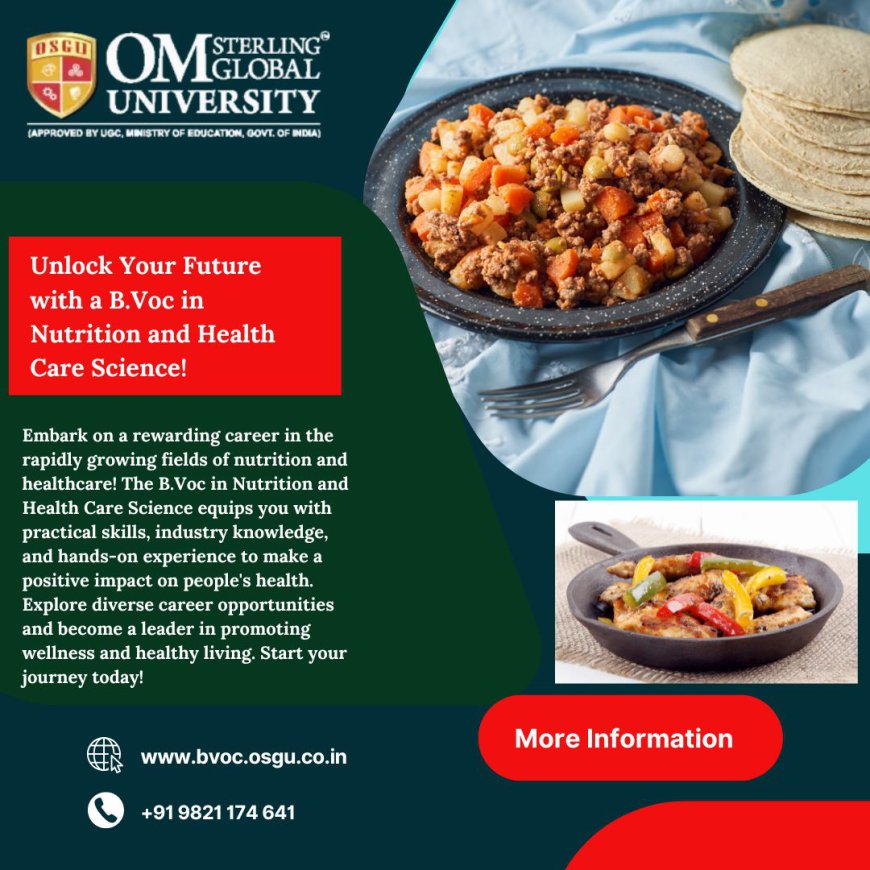Top Career Opportunities After B.Voc in Nutrition and Health Care Science
The B.Voc in Nutrition and Health Care Science is a practical, industry-focused degree that prepares students for careers in nutrition, dietetics, and healthcare. The program combines theoretical knowledge with hands-on experience in areas like human nutrition, food science, and health management. Graduates are equipped to work in diverse roles such as nutritionists, dietitians, and healthcare professionals, making a positive impact on public health and wellness.

Introduction
The field of nutrition and health care science is witnessing unprecedented growth due to increased global awareness about health and wellness. A Bachelor of Vocation (B.Voc) in Nutrition and Health Care Science offers a unique blend of practical skills and theoretical knowledge, paving the way for lucrative career paths in various sectors. In this article, we explore the top career opportunities available after completing a B.Voc in Nutrition and Health Care Science, emphasizing how this degree equips graduates for success.
What is B.Voc in Nutrition and Health Care Science?
A B.Voc in Nutrition and Health Care Science is a three-year undergraduate program designed to provide comprehensive knowledge about nutrition, dietetics, and healthcare management. This vocational course emphasizes skill-based education, ensuring that graduates are well-prepared for industry demands.
Career Opportunities After B.Voc in Nutrition and Health Care Science
1. Clinical Nutritionist/Dietitian
Clinical nutritionists play a crucial role in healthcare settings, working closely with doctors and patients to develop customized diet plans. They address specific health concerns such as diabetes, cardiovascular diseases, and obesity.
Key Responsibilities:
- Assessing patients’ nutritional needs.
- Designing personalized dietary programs.
- Monitoring and adjusting meal plans based on health progress.
2. Public Health Nutritionist
Public health nutritionists focus on community-level health initiatives. They work with government agencies, NGOs, and international organizations to improve public health outcomes.
Key Responsibilities:
- Developing community nutrition programs.
- Conducting health awareness campaigns.
- Collaborating with policymakers on nutrition policies.
3. Food Quality Control Officer
Ensuring food safety and quality is critical in the food industry. Food quality control officers inspect production processes and ensure compliance with health regulations.
Key Responsibilities:
- Monitoring food processing and packaging.
- Conducting quality tests.
- Implementing hygiene protocols in food production units.
4. Corporate Wellness Consultant
With rising health awareness, companies invest in employee wellness programs. Corporate wellness consultants design programs to improve workplace health and productivity.
Key Responsibilities:
- Assessing employee health metrics.
- Developing corporate wellness plans.
- Conducting workshops on nutrition and stress management.
5. Sports Nutritionist
Sports nutritionists work with athletes to optimize performance through tailored dietary plans. This role requires in-depth knowledge of sports physiology and nutrition.
Key Responsibilities:
- Evaluating athletes' nutritional needs.
- Creating diet plans for different training phases.
- Monitoring performance improvements linked to nutrition.
Entrepreneurial Opportunities
6. Health and Nutrition Startups
Entrepreneurs can leverage their knowledge to create health-centric businesses, such as organic food ventures, meal planning services, or wellness apps.
Potential Business Ideas:
- Organic food production.
- Online nutrition consulting platforms.
- Custom meal-delivery services.
7. Dietary Supplement Development
With the growing demand for supplements, creating a line of evidence-based, high-quality supplements can be a lucrative venture.
Steps to Establish a Supplement Business:
- Conduct market research on demand.
- Partner with certified manufacturers.
- Develop a robust marketing strategy.
Advanced Educational Pathways
8. Master’s in Nutrition or Dietetics
Pursuing a master's degree enhances career prospects and allows for specialization in fields such as clinical dietetics, public health nutrition, or sports nutrition.
9. Certification Courses
Certifications such as Certified Nutrition Specialist (CNS) or Registered Dietitian Nutritionist (RDN) add credibility and open doors to higher-paying roles.
Industries Hiring B.Voc Graduates
Healthcare Sector
Hospitals, clinics, and rehabilitation centers require skilled nutritionists to manage patient care effectively.
Food and Beverage Industry
Companies in this sector hire professionals for quality control, product development, and regulatory compliance.
Fitness and Wellness Industry
Gyms, health clubs, and wellness resorts need nutrition experts to offer holistic health solutions to clients.
Future Trends in Nutrition and Health Care Careers
Personalized Nutrition
Advancements in genetic testing are enabling personalized nutrition plans based on an individual’s genetic profile, offering new opportunities for specialization.
Telehealth and Online Consulting
The rise of telehealth has expanded the scope for remote nutrition consulting, making services more accessible and creating flexible career options.
Conclusion
A vocational training courses opens diverse and rewarding career paths in clinical settings, public health, corporate wellness, and entrepreneurship. With the growing emphasis on health and nutrition globally, graduates equipped with practical skills and industry knowledge are in high demand. Whether pursuing advanced education or entering the workforce, this degree provides a strong foundation for a successful and fulfilling career.
Frequently Asked Questions (FAQs)
1. What is the scope of a B.Voc in Nutrition and Health Care Science?
This degree offers diverse opportunities in clinical nutrition, public health, corporate wellness, and the food industry, along with entrepreneurial avenues.
2. Can I become a registered dietitian after completing B.Voc in Nutrition and Health Care Science?
Yes, you can pursue certification courses like the RDN to become a registered dietitian after completing this program.
3. Is a B.Voc degree recognized for higher education?
Yes, B.Voc degrees are recognized, and graduates can pursue master’s programs or specialized certifications in nutrition and health care fields.
4. What skills are essential for success in this field?
Key skills include strong knowledge of nutrition science, communication, analytical abilities, and problem-solving skills.
5. What industries hire graduates with this degree?
Graduates are hired in healthcare, food and beverage, fitness, corporate wellness, and public health sectors.
